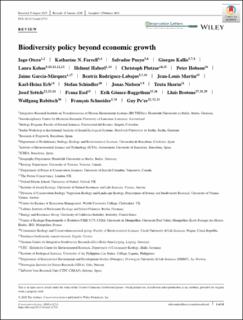Biodiversity policy beyond economic growth
Otero, Iago; Farrell, Katharine N.; Pueyo, Salvador; Kallis, Giorgos; Kehoe, Laura; Haberl, Helmut; Plutzar, Christoph; Hobson, Peter; Garcia-Marquez, Jaime; Rodríguez-Labajos, Beatriz; Martin, Jean-Louis; Erb, Karl-Heinz; Schindler, Stefan; Nielsen, Jonas; Skorin, Teuta; Settele, Josef; Essl, Franz; Gomez-Baggethun, Erik; Brotons, Lluis; Rabitsch, Wolfgang; Schneider, Francois; Pe'er, Guy
Peer reviewed, Journal article
Published version
Permanent lenke
https://hdl.handle.net/11250/2653179Utgivelsesdato
2020Metadata
Vis full innførselSamlinger
Sammendrag
Increasing evidence—synthesized in this paper—shows that economic growth contributes to biodiversity loss via greater resource consumption and higher emissions. Nonetheless, a review of international biodiversity and sustainability policies shows that themajority advocate economic growth. Since improvements in resource use efficiency have so far not allowed for absolute global reductions in resource use and pollution, we question the support for economic growth in these policies, where inadequate attention is paid to the question of how growth can be decoupled from biodiversity loss. Drawing on the literature about alternatives to economic growth, we explore this contradiction and suggest ways forward to halt global biodiversity decline. These include policy proposals to move beyond the growth paradigm while enhancing overall prosperity, which can be implemented by combining top-down and bottom-up governance across scales. Finally,we call the attention of researchers and policy makers to two immediate steps: acknowledge the conflict between economic growth and biodiversity conservation in future policies; and explore socioeconomic trajectories beyond economic growth in the next generation of biodiversity scenarios. biodiversity conservation, biodiversity loss, biodiversity policy, biodiversity scenarios, decoupling, degrowth, economic growth, postgrowth, sustainability policy, transition
